
Looking For Classic Games of Michael Jordan, Click on the Link Above
|
|
Michael Jordan Take Off Page |
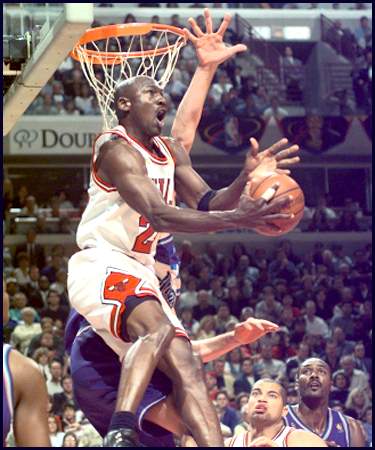 |
|
||
|
Air Jordan Takes Off |
Chicago Bulls/Washington Wizards |
[Biography] [Stats] [Pictures] [Chicago Bulls] [Records] [Multimedia]
Biography
BACKGROUND
A phenomenal athlete with a
unique combination of grace, power, artistry and improvisational ability,
Michael Jordan has single-handedly redefined the NBA superstar. The most
recognizable athlete in the world, he is not only the top player of his era,
but is quite possibly the best player ever to wear the uniform of an NBA team.
A legend on the court, Jordan added to his mystique with a totally unexpected
retirement just before the 1993-94 season. After a year spent playing minor
league baseball, he authored yet another amazing chapter to his story by
returning to the Chicago Bulls late in the 1994-95 campaign with his
basketball skills intact. In 1995-96 he won a record eighth scoring title and
led the Bulls to their fourth NBA championship of the 1990s, and in 1996-97 he
raised those numbers to nine scoring championships and six NBA crowns in the
decade. A summary of Jordan's basketball career inevitably fails to do it
justice. The 6-6 Brooklyn native attended high school in Wilmington, North
Carolina, where he was cut from the basketball team as a sophomore. He spent
his college career at North Carolina, playing for an NCAA Championship team as
a freshman and hitting the game-winning shot in the title game. He was named
College Player of the Year by The Sporting News in both 1983 and 1984 and won
the Naismith and Wooden Awards in 1984. After his junior year he was chosen
with the third overall pick in the 1984 NBA Draft by the Chicago Bulls. Jordan
burst into the big time with a fabulous first season, earning the NBA Rookie
of the Year Award in 1984-85 after averaging 28.2 points per game. An injured
foot sidelined him for 64 games in his second campaign, but he came back late
in the year to score an NBA playoff-record 63 points in a first-round game
against the Boston Celtics. Starting with the 1986-87 season he began a
career-long onslaught on the NBA record book. That year saw him average 37.1
points in the first of seven consecutive seasons in which he led the league in
scoring (a feat matched only by Wilt Chamberlain) and topped 30 points per
contest. By the time he announced his retirement in 1993, he had earned three
league MVP Awards, an NBA Defensive Player of the Year selection, a pair of
NBA slam-dunk championship titles, seven berths on the All-NBA First Team and
six selections to the NBA All-Defensive First Team. He also led the league in
steals three times. A nine-time All-Star Game selection, he earned the game's
MVP Award in 1988 after a 40-point performance. More than just a scoring
machine, Jordan also showed that he was a leader and a winner by guiding
Chicago to a trio of NBA Championships. As a rookie, he joined a Bulls team
that had won only 28 games the previous season. By 1991 the club had topped 60
wins during the regular season while marching to the first of three
consecutive titles. If anything, Jordan was even more spectacular in
postseason play. Prior to his retirement he had averaged below 30 points per
game in the postseason only once (29.3 ppg in his rookie year). In the 1985-86
postseason he poured in an astounding 43.7 points per contest. He left
basketball temporarily in 1993 as a three-time Finals MVP, and he owned a
career playoff average of 34.7 points per game, the best in NBA history. He
also had two Olympic gold medals to show for his participation on Team USA in
1984 and 1992. Jordan shocked the NBA by announcing his retirement prior to
the 1993-94 season. He spent the year playing minor league baseball for the
Class AA Birmingham Barons of the Chicago White Sox organization, for whom he
was a competent if unspectacular performer. But Jordan's hopes of reaching the
major leagues seemed dim, and with Major League Baseball embroiled in a labor
dispute as the 1995 season neared, he focused his competitive fire back on the
NBA. Late in the 1994-95 NBA season he came out of retirement and attempted to
carry the Bulls to another title. Jordan averaged 26.9 points in 17
regular-season games, then poured in 31.5 points per contest in the playoffs.
Despite Jordan's presence in it.
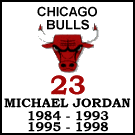
| Michael Jordan | PPG | RPG | APG | StlPG |
| College | 17.7 | 5.0 | 1.8 | 1.7 |
| Rookie | 28.2 | 6.5 | 5.9 | 2.4 |
| 1985-86 (18 gms) | 22.7 | 3.6 | 2.9 | 2.1 |
| 1986-87 | 37.1 | 5.2 | 4.6 | 4.6 |
| 1987-88 | 35.0 | 5.5 | 5.9 | 2.9 |
| 1988-89 | 32.5 | 8.0 | 8.0 | 3.2 |
| 1989-90 | 33.6 | 6.9 | 6.3 | 2.8 |
| 1990-91 | 31.5 | 6.0 | 5.5 | 2.7 |
| 1991-92 | 30.1 | 6.4 | 6.1 | 2.3 |
| 1992-93 | 32.6 | 6.7 | 5.5 | 2.8 |
| 1993-94 (retired) | ||||
| 1994-95 (17 gms) | 26.9 | 6.9 | 5.3 | 1.8 |
| 1995-96 | 30.4 | 6.6 | 4.3 | 2.2 |
| 1996-97 | 29.6 | 5.9 | 4.3 | 1.7 |
| 1997-98 | 28.7 | 5.8 | 3.5 | 1.7 |
| Career (thru '98) | 31.5 | 6.3 | 5.4 | 2.5 |
| Playoff (thru '98) | 33.4 | 6.4 | 5.7 | 2.1 |
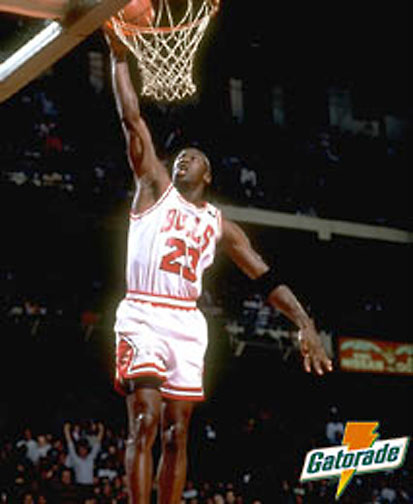 |
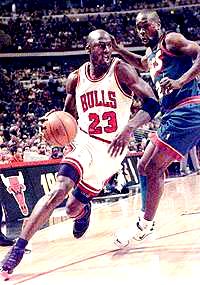 |
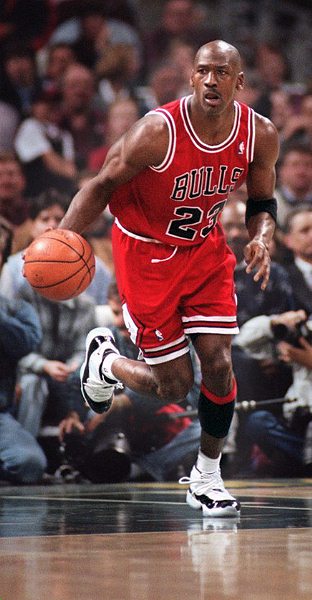 |
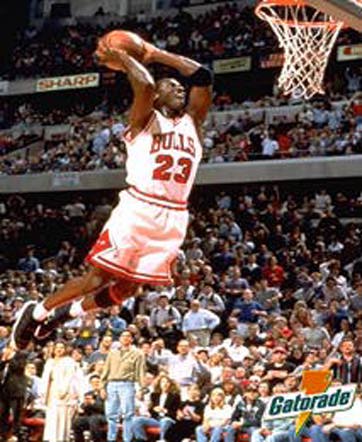 |
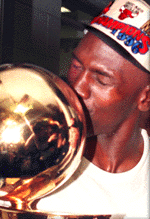 |
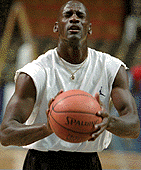 |